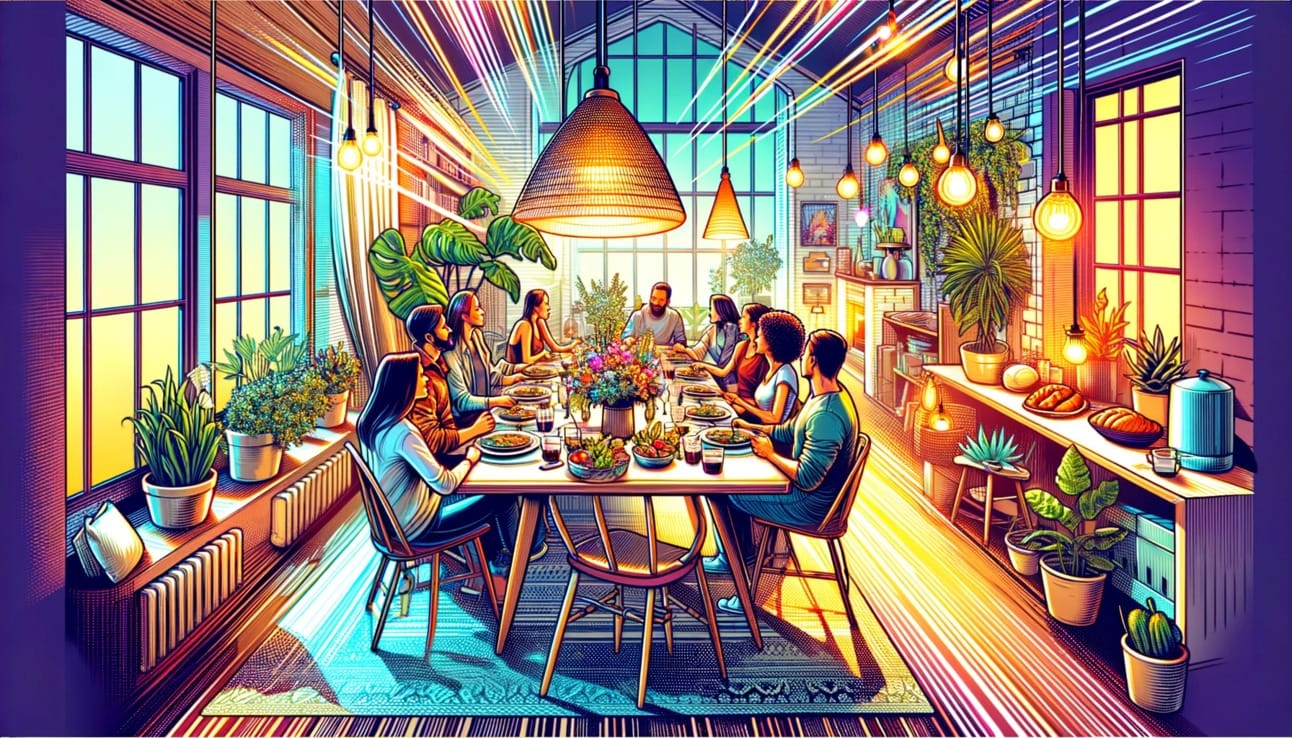The Advantage of Being Human

Here’s a little secret. I read open about 10 blog posts per day. I truly read one of them, skim the other two, and banish the other seven to my Instapaper folder, where I may or may not ever touch them again. Plenty of others die ‘on the vine’ of my Google Chrome browser tabs. This practice has gone on for nearly 7 years.
If you’re a serial blog-opener like me, you get it. But you also know that ever so often, you come across a few ideas that are too damn good to forget.
I stumbled across Nat Eliason’s Second Degree Dinners blog in 2017, during my junior year of college.
The premise was simple…
Want to meet interesting people doing cool things in your city? Host a ‘Second Degree Dinner.’
→ You and a friend choose to be 'hosts'
→ You invite one friend and then that person invites one friend
→ Your other host invites one friend and then that friend invites one friend
You end up with six people, all separated by one to two degrees of interesting friends.
"Damn, that's a sick idea," I thought, exhaling a bong rip and sinking even deeper into my couch, knowing damn well I had zero intention of hosting a dinner party anytime soon.
Still, the idea would pop back up in my head every few months. It became even more frequent after graduating college and moving to New York City when it was clear my interests (technology, early-stage startups, personal growth) had begun to diverge from many of my friends’.
Despite the rent prices which make me want to hurl myself off my 27th-floor rooftop, NYC is undeniably one of the greatest cities in the world — some of the smartest, most driven people packed into a (given the density) relatively small area of land.
The energy here is contagious. It reels you in.
But for the first few years living in New York, I didn't take full advantage of being so close to the epicenter of talent and ambition. When I settled back down here in November, I knew that had to change.
Over the last six weeks, I’ve hosted six second-degree dinners at restaurants across the city. The structure of these dinners is deceptively simple, yet the outcomes are anything but.

from our most recent dinner!
New Yorkers (myself included) have reputations for being impatient and transactional, but I've learned that slowed down over a shared meal, we all have stories worth telling. And dreams that feel a little less impossible when others believe in them too.
I've met an entrepreneur who helps brands go viral in China, another who sells sex chocolate, a quantum physicist, a handful of agency owners, an immigrant turned Harvard Business School grad, and even a marketer behind the viral Norwegian clown act that captivated audiences (and won) Britain's Got Talent.
Even better, a handful of these relationships have expanded beyond the initial dinner, transforming into individual lunches, hangouts, and invitations to meet their friends. These have turned into even more new relationships. The snowball effect has been wild.
Two weeks ago my friend Jacklyn – a very talented tech YouTuber and second-degree dinner co-host – tweeted about her experience at a few of these dinners.
The tweet popped off.
I woke up a few days later craving some engagement (as one who’s chronically online does), so figured I’d spin up a tweet of my own.
Mine also went off with nearly 100 more bookmarks than likes, the true indicator of a certified banger.
Two trends were abundantly clear:
- Tweeting about hosting any type of event in NYC (even if it’s the most boring shit you can think of) will likely do numbers on Twitter
- Even in the most densely populated cities in the world, people are craving human connection.
During the most recent dinner, I mentioned to one of the guests that I’d been hosting these for six straight weeks.
“That’s intense,” someone remarked. “Don’t you get tired?”
I wasn’t. If anything, it was the opposite. It was 9 pm after a long day, yet I felt like my energy was hitting its peak.
My mind immediately jumped to one of the few other blogs that have avoided its purge into my digital ether — Derek Sivers’ Happy, Smart, Useful.
In the blog, Derek lists the three things to consider when making life-size decisions…
1. What makes you happy
2. What’s smart — meaning long-term good for you
3. What’s useful to others
He then goes on to explain that most people’s decisions tend to forget one of these buckets.

Who doesn’t love a good Venn diagram?
I’ve contemplated at length how my career will align with all three of the buckets.
The truth? I haven’t found that sweet spot yet. I love entrepreneurship and technology. I’m a strong writer and speaker. I have a healthily delusional belief that very few things are truly “impossible” and that “realistic” is a function of hard work, resources, and critical thinking. But how all of that folds into my final path is still undiscovered.
Only a few days ago did I realize I was missing a key part of the puzzle.
Dating back to high school, I’ve taken immense joy in planning events, meeting new people, and thoughtfully bringing different people together.
In college, I was the social of my fraternity responsible for schmoozing with dozens of sorority girls (many of whom were convinced they were God’s gift to earth) about when we would party with them, and then organize and throw each of these said parties. A hellish job to most, but I genuinely enjoyed it and made some great friendships in the process.
One of the other ‘socials’ that I became friends with ended up being a large part of the reason I landed my job at Bombas. It’s crazy how that shit works.
These dinners are the next iteration of this. They bring me immense happiness. They create and nurture new serendipitous friendships that could prove invaluable long-term. But most importantly, they serve a broader purpose, offering community, and sparking others’ new relationships and ideas.
And over the next ten years, I truly believe that hosting dinners and events will be some of the most impactful work I will ever do.
In 1993, British anthropologist Robin Dunbar theorized that humans could not cognitively handle more than 150 stable social relationships. This has become known as ‘Dunbar’s Number.’
Of course, this was suggested nearly a decade before MySpace even launched, and technology has drastically changed the way that we interact with those around us. But even though the amount of relationships we “sustain” has increased with social media, the strength of many of these friendships has decreased. We spend more time on these low-bandwidth virtual relationships, and less time in person where the deepest connection is formed.
cool drawing courtesy of Christopher Roosen
If connecting people is one of your talents, you have a massive competitive advantage – one that will only continue to compound as future generations withdraw from physical interaction.
Gen Z is developing a fear of phone calls, with nine in 10 graduates in the workforce avoiding in-person events because of social anxiety. Nearly a quarter are scared of speaking up in team meetings and sharing their ideas. In Japan, nearly 1 million people have fallen victim to “hikikomori”, withdrawing themselves from society to remain isolated in their rooms for months or years. In May (2023), U.S. Surgeon General Dr. Vivek Murthy released an advisory calling attention to the ‘epidemic of loneliness’ responsible for premature death levels similar to that of daily smoking.
As we become even more immersed in our digital worlds, with the soon-to-be mainstream arrival of spatial computing, I expect our society to inch even farther into this disconnection.
As a result, we will likely see a rise in paid organized events and retreats focused simply on unplugging and meeting new people.
If you’re thinking… isn’t that just normal social life? Yes. And that’s the problem.
Most people have forgotten how to genuinely connect face-to-face. That’s why people-people will always be needed.
While AI will likely soon handle many cognitive tasks, the differentiator will be real emotional intelligence - your ability to build relationships, comfort team members, or support someone going through profound life changes. Behind every screen is still a living, breathing person longing to be seen, heard, and understood. Only those who master both digital fluency and human connection will thrive.
No matter how hard we try, that capacity for compassion and vulnerability can't be replicated online. And as we’ve seen from the influx of layoffs where loyal employees are abruptly let go via automated generic emails, it’s clear that today’s “leaders” are losing their authenticity and resonance. They can quantify analytics but not qualify human costs. As we become more detached, these gaps only widen.
Lucky for us people-people, difficulty breeds opportunity. Model genuine interest in lives unlike your own. Forge spaces where people feel welcomed exactly as they are - imperfections and all. Make the effort to invest in the face-to-face community when it’s cheaper and more convenient to hide behind devices.
What seems easy for you is likely very hard for someone else, so double down and use your talents wisely.
It’s never been a better time to be a people-person.
